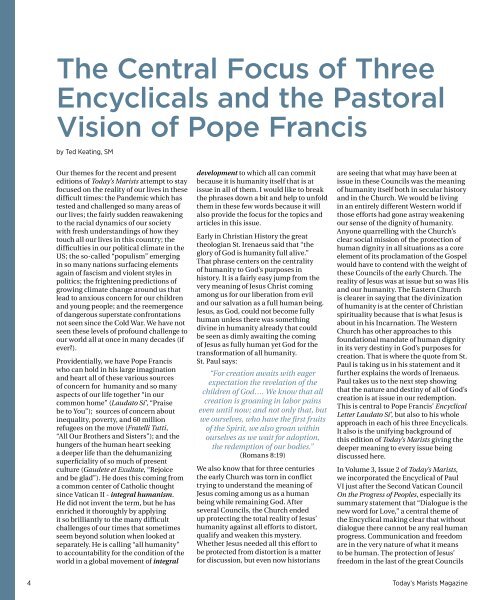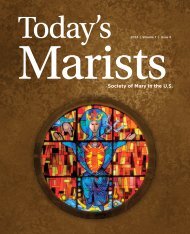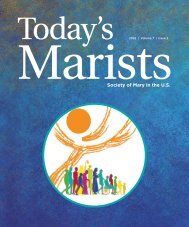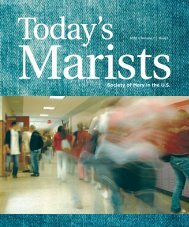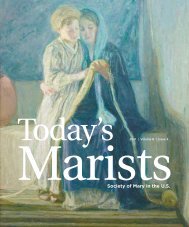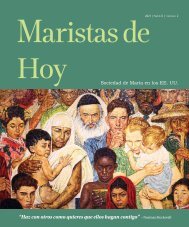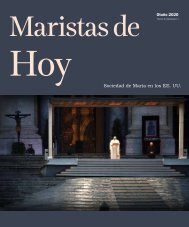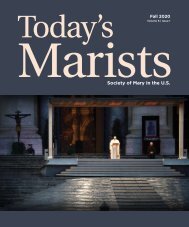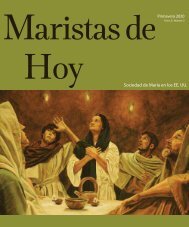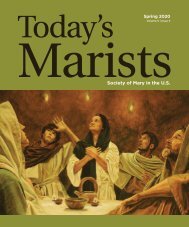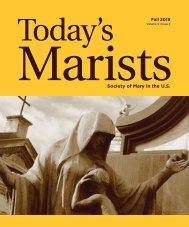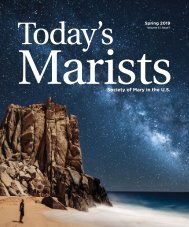Today's Marists Volume 6, Issue 2
- No tags were found...
You also want an ePaper? Increase the reach of your titles
YUMPU automatically turns print PDFs into web optimized ePapers that Google loves.
The Central Focus of Three<br />
Encyclicals and the Pastoral<br />
Vision of Pope Francis<br />
by Ted Keating, SM<br />
Our themes for the recent and present<br />
editions of Today’s <strong>Marists</strong> attempt to stay<br />
focused on the reality of our lives in these<br />
difficult times: the Pandemic which has<br />
tested and challenged so many areas of<br />
our lives; the fairly sudden reawakening<br />
to the racial dynamics of our society<br />
with fresh understandings of how they<br />
touch all our lives in this country; the<br />
difficulties in our political climate in the<br />
US; the so-called “populism” emerging<br />
in so many nations surfacing elements<br />
again of fascism and violent styles in<br />
politics; the frightening predictions of<br />
growing climate change around us that<br />
lead to anxious concern for our children<br />
and young people; and the reemergence<br />
of dangerous superstate confrontations<br />
not seen since the Cold War. We have not<br />
seen these levels of profound challenge to<br />
our world all at once in many decades (if<br />
ever?).<br />
Providentially, we have Pope Francis<br />
who can hold in his large imagination<br />
and heart all of these various sources<br />
of concern for humanity and so many<br />
aspects of our life together “in our<br />
common home” (Laudato Sí’, “Praise<br />
be to You”); sources of concern about<br />
inequality, poverty, and 60 million<br />
refugees on the move (Fratelli Tutti,<br />
“All Our Brothers and Sisters”); and the<br />
hungers of the human heart seeking<br />
a deeper life than the dehumanizing<br />
superficiality of so much of present<br />
culture (Gaudete et Exultate, “Rejoice<br />
and be glad”). He does this coming from<br />
a common center of Catholic thought<br />
since Vatican II - integral humanism.<br />
He did not invent the term, but he has<br />
enriched it thoroughly by applying<br />
it so brilliantly to the many difficult<br />
challenges of our times that sometimes<br />
seem beyond solution when looked at<br />
separately. He is calling “all humanity”<br />
to accountability for the condition of the<br />
world in a global movement of integral<br />
development to which all can commit<br />
because it is humanity itself that is at<br />
issue in all of them. I would like to break<br />
the phrases down a bit and help to unfold<br />
them in these few words because it will<br />
also provide the focus for the topics and<br />
articles in this issue.<br />
Early in Christian History the great<br />
theologian St. Irenaeus said that “the<br />
glory of God is humanity full alive.”<br />
That phrase centers on the centrality<br />
of humanity to God’s purposes in<br />
history. It is a fairly easy jump from the<br />
very meaning of Jesus Christ coming<br />
among us for our liberation from evil<br />
and our salvation as a full human being.<br />
Jesus, as God, could not become fully<br />
human unless there was something<br />
divine in humanity already that could<br />
be seen as dimly awaiting the coming<br />
of Jesus as fully human yet God for the<br />
transformation of all humanity.<br />
St. Paul says:<br />
“For creation awaits with eager<br />
expectation the revelation of the<br />
children of God…. We know that all<br />
creation is groaning in labor pains<br />
even until now; and not only that, but<br />
we ourselves, who have the first fruits<br />
of the Spirit, we also groan within<br />
ourselves as we wait for adoption,<br />
the redemption of our bodies.”<br />
(Romans 8:19)<br />
We also know that for three centuries<br />
the early Church was torn in conflict<br />
trying to understand the meaning of<br />
Jesus coming among us as a human<br />
being while remaining God. After<br />
several Councils, the Church ended<br />
up protecting the total reality of Jesus’<br />
humanity against all efforts to distort,<br />
qualify and weaken this mystery.<br />
Whether Jesus needed all this effort to<br />
be protected from distortion is a matter<br />
for discussion, but even now historians<br />
are seeing that what may have been at<br />
issue in these Councils was the meaning<br />
of humanity itself both in secular history<br />
and in the Church. We would be living<br />
in an entirely different Western world if<br />
those efforts had gone astray weakening<br />
our sense of the dignity of humanity.<br />
Anyone quarrelling with the Church’s<br />
clear social mission of the protection of<br />
human dignity in all situations as a core<br />
element of its proclamation of the Gospel<br />
would have to contend with the weight of<br />
these Councils of the early Church. The<br />
reality of Jesus was at issue but so was His<br />
and our humanity. The Eastern Church<br />
is clearer in saying that the divinization<br />
of humanity is at the center of Christian<br />
spirituality because that is what Jesus is<br />
about in his Incarnation. The Western<br />
Church has other approaches to this<br />
foundational mandate of human dignity<br />
in its very destiny in God’s purposes for<br />
creation. That is where the quote from St.<br />
Paul is taking us in his statement and it<br />
further explains the words of Irenaeus.<br />
Paul takes us to the next step showing<br />
that the nature and destiny of all of God’s<br />
creation is at issue in our redemption.<br />
This is central to Pope Francis’ Encyclical<br />
Letter Laudato Sí’, but also to his whole<br />
approach in each of his three Encyclicals.<br />
It also is the unifying background of<br />
this edition of Today’s <strong>Marists</strong> giving the<br />
deeper meaning to every issue being<br />
discussed here.<br />
In <strong>Volume</strong> 3, <strong>Issue</strong> 2 of Today’s <strong>Marists</strong>,<br />
we incorporated the Encyclical of Paul<br />
VI just after the Second Vatican Council<br />
On the Progress of Peoples, especially its<br />
summary statement that “Dialogue is the<br />
new word for Love,” a central theme of<br />
the Encyclical making clear that without<br />
dialogue there cannot be any real human<br />
progress. Communication and freedom<br />
are in the very nature of what it means<br />
to be human. The protection of Jesus’<br />
freedom in the last of the great Councils<br />
4 Today’s <strong>Marists</strong> Magazine


